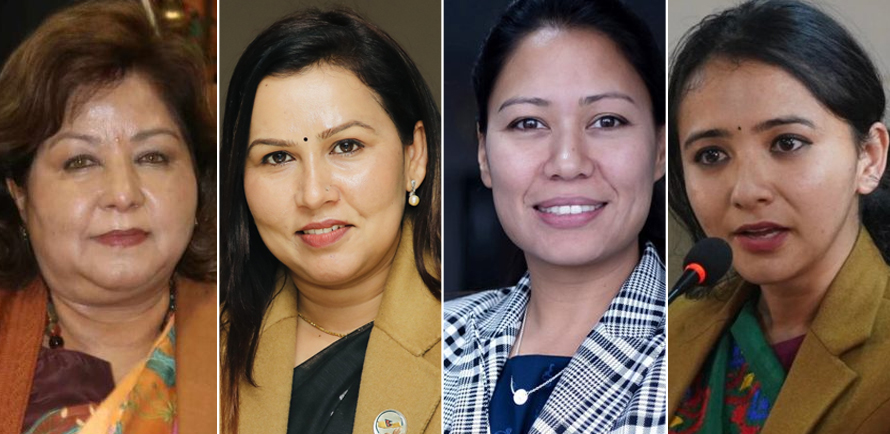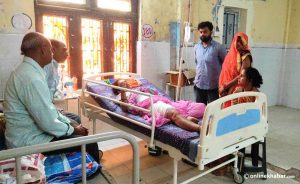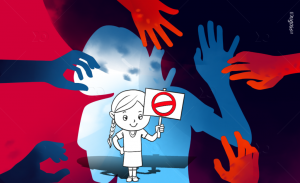
As the world is going through a pandemic, many countries, including Nepal, are under lockdowns after the rise in Covid-19 cases. During this humanitarian crisis, sadly, another crisis of violence against women is happening.
Violence against women and girls is one of the most prevalent human rights violations in the world. Globally, it is estimated that one in three women experience physical or sexual abuse in her lifetime. In the context of Nepal, violence against women is highly prevalent due to existing deep-rooted patriarchy and gender roles. Violence against women in Nepal during the lockdown has seen an upsurge. Women Rehabilitation Center (WOREC) documented 624 cases of violence against women and girls from 55 districts during the lockdown.
Due to existing patriarchal social structures in Nepal, women are marginalised from decision-making positions in social, economic, and legal sectors, rendering them vulnerable. They are at a high risk of sexual assault and exploitation every day and the risk is even higher during any crisis. During this lockdown too, women are being physically and psychologically exploited as many women find themselves forced to be confined and isolated with domestic abusers; isolation is generally used by many perpetrators as a tool of control; conditions created by the pandemic is a perfect opportunity for domestic abuse to flourish.

The current circumstances make reporting even harder, due to limitations on women’s and girls’ access to phones, and disrupted public services like police, justice systems and social workers. These disruptions may also be compromising the care and support that survivors need, like clinical management of rape, and mental health and psychosocial support. They also fuel impunity for the perpetrators. Most sadly, the survivors cannot seek support as movement is restricted and/or the abusers are from their family. The consequences include serious physical, mental, sexual and reproductive health problems, including sexually transmitted infections like HIV and unplanned pregnancies. Reports suggest low help-seeking behaviours and low incident reporting among survivors.
The government of Nepal planned to provide essential GBV prevention and response-related health and social services including psychosocial counselling, female-friendly spaces and shelters and strengthen referral pathways and scale up remote modalities to address GBV cases, such as hotlines and mobile counselling services, with training for frontline workers in collaboration with different I/NGOs during this pandemic situation. Additionally, the Ministry of Women, Children and Senior Citizens also developed an action plan to address the problems facing women, children, differently-abled persons and senior citizens during the Covid-19 pandemic, with an objective of providing emergency services to women, children, differently-abled persons and senior citizens; preventing potential violence and discrimination against them.
Along with this, different organisations such as Nepal Red Cross Society, Asha Crisis Centre, Transcultural Psychosocial Organisation (TPO), WOREC and National Women Commission are operating helpline services and offering counselling, legal services, therapy sessions through phone calls and social media for domestic violence survivors. However, due to the absence of a mechanism to appropriately address violence against women and girls, their vulnerability to both pandemic and violence has increased.

Crucial and safety nets such as effective helplines, psychosocial support and online counselling should reach to the unreached, using technology-based solutions such as SMS, online tools and networks to expand social support and to reach women with no access to phones or the internet. The information regarding counselling and legal services needs to be advertised widely at all media platforms including social media platforms, electronic and print media, public messaging at supermarkets, pharmacies and other appropriate areas so that information can reach out to the grassroots. Other priorities include a more responsive and gender-sensitive police force and procedure to help women and girls vulnerable to abuse in order to triumph over the immediate and long-term impact of this crisis.
The government must create an enabling and safe environment to access essential services, response plans and strategies to deal with violence against women during the Covid-19 crisis. Also, for the sustainable solution of the issues related to violence against women, the root cause—patriarchy—must be addressed. It is necessary to bring systematic changes. Social institutions such as education, politics, media, religion, judiciary system and political system are required to be gender-sensitive. Otherwise, it is hard to address consistent abuse and violence against women.
























